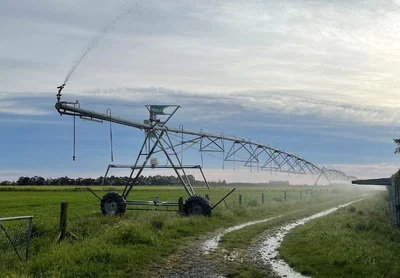Farmers urged to plan for drought conditions

Mid Canterbury farmers face a summer of potential drought and water restrictions as an El Nino weather pattern plays out.
The National Institute of Water and Atmospheric Research (NIWA) and other weather experts expect drought conditions to prevail on the east coast of South Islands – while the west coast is likely to be wetter than usual.
Apart from less rain, the frequent westerly winds play a part in drying out the area. Weather systems pass over the region faster while the dry winds reduce water levels, dry out the land and evaporate water surfaces faster.
Mid Canterbury Federated Farmers president David Acland said local crop farmers were "pretty happy" with the hot and dry conditions at the start of January which was perfect for harvest. But streams and rivers were running low and water restrictions were in place in some areas, which was a concern.
Dry conditions could affect crops in the ground as well as the set up for winter crops.
He said the foothills area was starting to dry up with water restrictions in place for Mount Somers.
The Acland's farm had about 7ml of welcome rain last week, but the farm had not been this dry for several years - "since before the 2020 floods".
Acland said farmers will need to plan for the conditions - and may need to take a financial decision to sell short to ensure long-term survivability.
The Ashburton District Council said river and spring flows had dropped noticeably as it imposed restrictions for Dromore and users on the Methven Springfield and Montalto supplies in the second week of January.
The council also warned it could not guarantee the supply of water for stock and advised farmers to find alternative water supply for stock.
Infrastructure and Open Spaces Group Manager Neil McCann said people should have water storage tanks or an alternative supply ready to use if needed.
“Now is also a good time to remind people to ensure their races are clean so that the stockwater we do have can flow freely down the races to all users. While we will do our best to get water across the network, this may be challenging, and in fact not possible in the coming weeks," he said.
Horticulture New Zealand said planning was crucial to surviving an El Nino drought.
It recommends farmers actively monitor weather forecasts alongside their crop health and strategies to manage potential drought conditions and optimise water use and plant health.
It suggested farmers plan for possible water restrictions and ensure that irrigation water is used as efficiently as possible. This includes ensuring irrigation systems are maintained and free of leaks and watering plants in the coolest part of the day to minimise water loss to evaporation.
Another tip from Horticulture NZ was to irrigate the most profitable blocks first, irrigating crops fully during critical periods, but not at other times, monitoring soil moisture, and taking water stress measurements to decide which crops to irrigate.
By Sharon Davis

